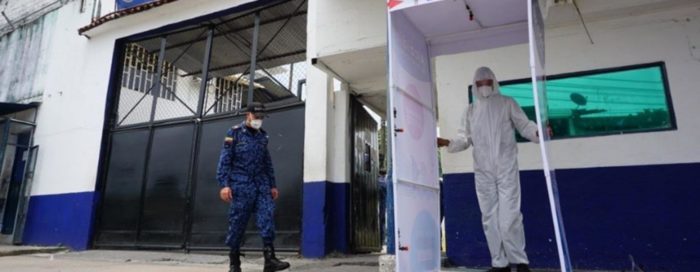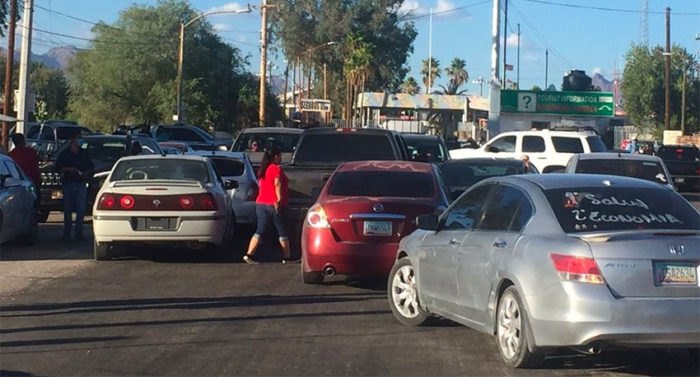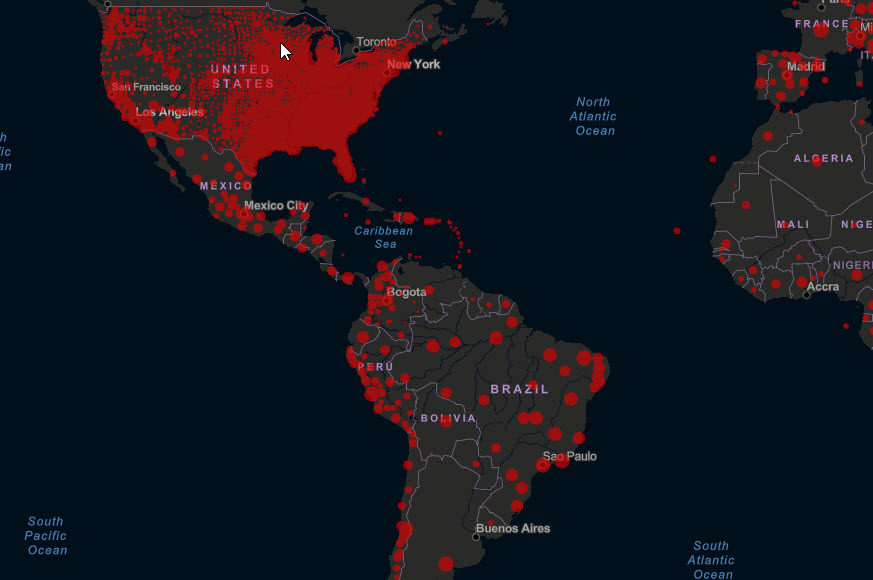- By Emily Gregg, edited by Mike Gatehouse.
- LAB has put together this eleventh overview of the spread of coronavirus across the region and the reaction of governments, politicians and local communities. With our limited resources we could not hope to provide a truly comprehensive survey.
- Figures for infections and mortality, summarised in the table at the end, are those given by the World Health Organisation Situation Report 185 on Thursday 23 July, and John Hopkins University Coronavirus Centre, as of midday Thursday 23 July. Where figures appear in the images within the article, they may refer to earlier dates. We are unable to provide figures on excess deaths due to the lack of data for most countries in the region.
- LAB will attempt to follow up this story, focusing on the poor, marginal communities, indigenous groups and inequalities in treatment and economic compensation for the effects of this terrible pandemic on individuals and families.
- See LAB articles at the head of our Home Page and in the Covid-19 section for further news, testimony & information. See also the posts on our Facebook page.
Poverty and Hunger
The UN’s Food and Agriculture Organisation (FAO) released a report on 13 July, which outlines the devastating levels of hunger in Latin America, worsened by the impact of the pandemic.
In the past five years, levels of hunger have risen, and they are expected to affect up to 9.5 per cent of the region’s population by 2030. Quarantines, lockdowns, and economic downfalls have severely worsened the situation. A representative of the FAO for Latin America, Julio Berdegué, attributed the increase in hunger to structural inequalities and weak economic growth. He described the situation as ‘chilling’.
The Economic Commission for Latin America and the Caribbean (CEPAL) estimates that the pandemic will cause an unprecedented drop in the region’s economies that will put millions into poverty and unemployment. It also estimates that one in three in Latin America and the Caribbean will be in poverty this year. Haiti and Venezuela are believed to be the countries most affected, as well as Guatemala, El Salvador, and Honduras.
You will find many more articles on the Covid-19 crisis on our website. Go to our Home Page to see the latest, or for a full list, go to the News page. You can also keep up-to-date by subscribing to our (free) monthly e-mail newsletter.
Are pension funds the solution?
Allowing people to access their pension pots is increasingly seen as an answer to financial struggles.
In Mexico, pension withdrawals have reached historic highs. A total of MX$1,856 million (around US$83 million) were withdrawn in June, compared to around half of that amount in the same month last year. In the first half of 2020, partial withdrawal of funds by unemployed Mexicans reached MX$8,570 million (US$381 million). The Mexican organisation for social security, IMSS, reported that 83,311 formal jobs were lost in June, and over a million have been lost since the beginning of the health emergency.
Chile’s Chamber of Deputies controversially voted to allow people to access their pension pots. The bill would allow citizens to access 10 per cent of the pension funds to help mediate financial difficulties during the pandemic. It follows Peru’s lead, where Congress published a law on 1 May, that allows AFP (Administradoras de Fondos de Pensiones) subscribers to withdraw up to 25 per cent of their pension pots, up to a maximum of s/12,900 (around US$3,700).

Protests in Chile since October 2019 have heavily criticised the AFP system, due to its structure that often leaves pensioners below the poverty line. The night before the bill was passed, Chile’s capital Santiago saw barricades and cacerolazos (pot-banging protests) in support of the measure.
President Sebastian Piñera and his most loyal followers were ardently against the pensions access measure. They argued that it will affect pensions in the future, and rumours circled of underhand tactics to prevent the measure from passing. The day before the bill passed, the president announced new measures to help the middle class during the pandemic. One of the measures was a benefit of US$630 to members of the middle class, whether working or unemployed. The announcement was a bid to dissuade members of the coalition from supporting the pension bill. Nonetheless, some members of his centre-right coalition joined with the opposition to allow the bill to pass by just two votes.
The Senate approved the reform on 22 July. The bill will return to the lower house for a final debate and vote.
Bruno Funchal, Brazil’s treasurer, also mooted the possibility of allowing Brazilians to withdraw from their pensions. He mentioned in an online event that ‘it has benefits, but it can bring some costs’.
If you find this article useful, please consider donating to LAB. At present LAB is run entirely by volunteers. If we had more resources, we could do so much more. You can donatehere -we are a registered charity. If you can make a regular or monthly donation that will help us to plan and extend our work.
Bolivia
On 9 July, Jeanine Añez, Bolivia’s interim president, confirmed that she had tested positive for Coronavirus. She shared the news on Twitter and said that she was well and isolated. Seven Bolivian ministers have tested positive for the virus.
As the number of cases grows in Bolivia and people become more desperate, chlorine dioxide is increasingly believed to be a cure for the virus. Although its proclaimed abilities to cure coronavirus, amongst other diseases, are false, and the Health Ministry has warned of the dangers of ingesting the toxic substance, Bolivia’s main cities have seen queues to buy the disinfectant.
At least five people are known to have died after taking the substance in La Paz.
Opposition-controlled congress has promoted its use ‘for the prevention and treatment of coronavirus’, and the Senate has approved a bill to authorise its production and sale for the purpose. Cochabamba state’s governor, Esther Soria, and the city’s mayor, José María Leyes, have both expressed their support for its use and distribution. Soria was also stated to have denied the existence of the virus, but has vehemently denied the report.
In the toxic and highly polarised political situation in Bolivia, it is hard to establish the facts. Matters are made more difficult by the electoral tribunal’s ruling to further postpone the presidential elections originally scheduled for 3 May, then 6 September and now 10 October.
Brazil
Brazil surpassed the milestone of 2 million cases on 16 July. It came only 27 days after the country’s total reached 1 million. Although the rate of infection has stabilised or even slowed in big cities like Rio de Janeiro and Sao Paulo, the virus is hitting more rural areas. Despite climbing numbers, President Jair Bolsonaro has pressured local governments to lift restrictions.
Rio de Janeiro is one of the cities to have relaxed the visits. Nonetheless, as residents continue to avoid the city’s famous beaches, birds are reported to have returned and the water to be cleaner.
Mr Bolsonaro, who initially tested positive for Coronavirus at the beginning of the month, has since tested positive twice more. The most recent test was on 21 July. His wife and two daughters with whom he lives tested negative.
Brazil’s Press Association have announced that they will file legal action against Mr Bolsonaro for removing his mask in the press conference in which he first announced that he tested positive. The president has consistently downplayed the virus, describing it as a ‘little flu’. The association alleges that Bolsonaro’s crimes include risking the life and health of another and of not avoiding the spread of an infectious illness.
Colombia
Human Rights Watch published a report last week about armed groups’ draconian enforcement of lockdown measures. The report mentions that guerrilla fighters and criminal groups have threatened, attacked, and killed 9 civilians who have failed to comply with the lockdown rules implemented by the gangs. The rules, which affect at least 11 of the country’s 32 departments, are often harsher than those established by the Colombian national government.
On 7 July, one of the groups mentioned in the report, the Ejército de Liberación National (ELN), proposed a bilateral ceasefire to help fight the pandemic. It follows the UN Security Council’s adoption of a resolution at the beginning of the month that called for a ceasefire across the world. The group also mentioned Pope Francis’s call for peace in his Easter address as a reason for their proposal. The message noted that a ceasefire ‘would create a climate of humanitarian distension, [that would be] favourable to restart peace talks between the government and the ELN.’
The group had initiated a unilateral ceasefire in April after UN Secretary General António Guterres’s plea. However, President Ivan Duque refused to enter talks until the group stops kidnapping, recruiting minors, and ends its attacks. Duque responded to the latest proposal with a reiteration of the government’s demand for the release of all hostages and an end to attacks. The ELN have rejected Duque’s demands.
Rates of infection of coronavirus in Colombia’s prisons continue to be a concern. Until 14 July, there were 1,639 recorded cases in prisons and eight deaths. Some 2,185 prison workers, guards, and interns had recovered from the virus.
One of the worst-affected prisons, Villavicencio, has been ordered by a tribunal to provide masks for the inmates and biosecurity suits for guards. At least 216,000 basic facemasks, a further 5,280 N95 masks, and 23 thermometers will be provided, along with disinfectant and cleaning equipment. However, the decision to move prisoners with HIV, diabetes or cancer to another institution was overturned.

Colombia’s capital, Bogotá, began a ‘rotational’ quarantine on 13 July. The capital has seen almost a third of all the country’s cases and around a fifth of its Covid-related deaths. The city’s localities will quarantine for two weeks at a time, with varying start dates. The restriction aims to reduce the number of people moving around the city by 2.5 million each day. A strict curfew between 8pm and 5am will be enforced for everyone in the quarantined localities. Essential workers, including those who work in health, security, and transport, may leave their homes during the quarantine. The quarantine will last until 23 August.
Mexico
Residents of Sonoyta, which borders the US state Arizona, blocked the road to the beach town of Puerto Peñasco with their vehicles. Sonoyta’s mayor, José Ramos Arzate, publicly invited US tourists ‘not to visit Mexico’ to prevent the spread of coronavirus in the town, given the accelerating infection rate across the border. During the fourth of July weekend, those entering from the US into the Mexican state of Sonora were turned back if their trips were deemed unnecessary. However, trips to Puerto Peñasco were exempt, leading to locals to take the situation into their own hands.

New figures show that violent crimes against women have surged in the first half of 2020. Women’s shelters have borne the brunt of public funding cuts during the pandemic. The country’s president, universally known as AMLO, has downplayed the issue despite widespread concerns of the impact of lockdowns for vulnerable women. April saw more femicides than any other month on record and, in the first six months of this year, femicide rates increased by 7.7 per cent. The National Network of Shelters reports an increase of 80 per cent in the number of calls it has received during the pandemic. Its 69 shelters have seen an increase of 50 per cent in the number of admittances.
However, the government’s cuts to the federal women’s institute’s budget by 75 per cent just last week threaten the survival of the refuges and pose a troubling threat to women’s safety in Mexico.
Peru
After a cabinet reshuffle, Peru’s new Health minister, Pilar Mazzetti, has highlighted the dismal state of the country’s health system. The Peru Support Group reports that in Arequipa, one of the worst hit regions, people have received oxygen in hospital car parks, while others are dying in their homes or in the streets. Alarmingly, there have also been reports of bodies decomposing in the halls of one of the region’s hospitals. Despite the growing numbers of cases, Mazzetti said that lockdown is not a possibility for the immediate future.
High rates of infection amongst mine workers is raising concerns. The minister of energy and mines, Susana Vilca, reported in a press conference that, as of 9 July, 2 per cent of workers – around 3,000 people – have contracted the virus, and two workers have died. The industry provides 60 per cent of Peru’s exports and the country is the world’s second largest producer of copper.
The Peruvian government continues to make inconsistent decisions with regards to the guidelines and actions affecting indigenous peoples. At the beginning of the month, the Ministry of Health issued guidelines to protect people in voluntary isolation, which included guaranteeing healthcare, the provision of information for neighbouring areas, and the guidance for those who enter with food and emergency provisions. On 5 July, an Indigenous Covid Command was inaugurated in Madre de Dios, the third such command in Peru. The president of the regional indigenous federation (FENAMAD), Julio Cusurichi, will lead the command. Indigenous communities have sought greater involvement in the response to the virus.
Despite these steps forward, FENAMAD has declared a state of emergency in the Peruvian Amazon and announced protests against the government due to the presence of a logging company in the reserve of the Mashco Piro community, despite their voluntary isolation. The state granted authorisation to the company in early June and the Ministry of Culture has not commented on the issue. FENAMAD demand the protection of the health of the Mashco Piro and guarantees for their territorial integrity.
Venezuela
The situation in Venezuela, the reality of which remains somewhat obscure, is reported to be spiralling out of control. An infection disease specialist and member of the medical team for opposition leader Juan Guaidó, has said that the number of cases increases at a rate of 33 per cent every seven days. The government, however, attributes the increase to Venezuelans who are returning from other countries. It has blamed the ‘Colombian virus’ – claimed to be a more aggressive strain of the virus -for the high number of cases and deaths in bordering states, such as Zulia. The opposition have argued that it is more likely due to lack of electricity and water.
President Nicolás Maduro has claimed that an agreement made with the opposition to tackle coronavirus was a hoax. The deal was agreed to gain support from the WHO and financial aid to deal with the pandemic. However, in a televised meeting, he claimed that that nothing had arrived. He described the deal as a ‘lie’, saying that ‘everything that comes from the gringo empire is a lie.’
The governor of Zulia, Omar Prieto, was hospitalised with respiratory problems on 7 July. He is reported to have made a ‘stark recovery’. Diosdado Cabello, the first vice president of the ruling Socialist Party and head of the Constituent Assembly also announced that he has tested positive for the virus.
Country by country summary. Case and death figures from WHO Situation Report 185, Thursday 23 July 2020, and John Hopkins University Coronavirus Centre as of midday, 23 July 2020.
Reports from some individual governments and unofficial sources suggest considerably higher figures.
| Country | WHO Situation Report 185 | John Hopkins University | ||
|---|---|---|---|---|
| Cases | Deaths | Cases | Deaths | |
| Argentina | 136,118 | 2,506 | 141,900 | 2,588 |
| Belize | 43 | 2 | 43 | 2 |
| Bolivia | 62,357 | 2,273 | 64,135 | 2,328 |
| Brazil | 2,159,654 | 81,487 | 2,227,514 | 82,771 |
| Chile | 336,402 | 8,722 | 334,683 | 8,677 |
| Colombia | 211,038 | 7,166 | 218,428 | 7,373 |
| Costa Rica | 11,811 | 68 | 12,361 | 71 |
| Cuba | 2,462 | 87 | 2,462 | 87 |
| Dominican Republic | 56,043 | 1,005 | 56,043 | 1,005 |
| Ecuador | 77,257 | 5,418 | 77,257 | 5,418 |
| El Salvador | 12,975 | 363 | 13,377 | 372 |
| Guatemala | 41,135 | 1,573 | 41,135 | 1,573 |
| Haiti | 7,146 | 154 | 7,167 | 154 |
| Honduras | 35,345 | 988 | 36,102 | 1,006 |
| Mexico | 356,255 | 40,400 | 362,274 | 41,190 |
| Nicaragua | 3,004 | 108 | 3,439 | 108 |
| Panama | 55,153 | 1,159 | 55,906 | 1,180 |
| Paraguay | 3,817 | 35 | 4,000 | 36 |
| Peru | 362,087 | 13,579 | 366,550 | 13,767 |
| Puerto Rico | 13,038 | 185 | data unavailable | data unavailable |
| Venezuela | 12,774 | 120 | 13,164 | 124 |
Emily Gregg is a LAB correspondent and author. She lived in Arica, Chile, until returning to the UK because of the pandemic. She also wrote The Student Revolution chapter in LAB’s book Voices of Latin America (2019).

